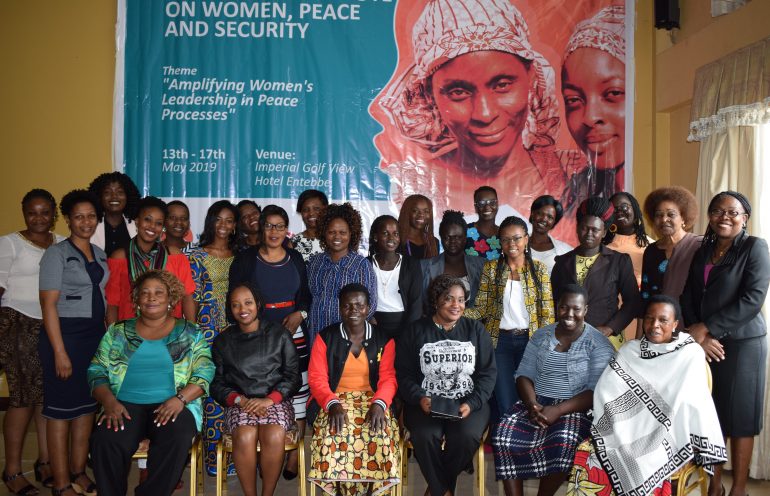As one of the leading actors on Women, Peace and Security, Women’s International Peace Centre prioritises strengthening and re-igniting women’s leadership potential to build peace because women and girls bear the burden of armed conflict and war. The periods of transition from conflict to peace offer opportunities for women to participate in the rebuilding and reshaping of societies. However, to enable women maintain the momentum required in the different spaces of engagement, they require specialized skills and a support network. The 2019 5-day WIPC Leadership Institute focused on 20 vibrant women leaders from South Sudan, Burundi and Democratic Republic of Congo (DRC) including refugee women leaders living in Uganda. These countries assented to the UN Security Council Resolution 1325 and have developed National Action Plans for its implementation.
The training focused on three modules; Feminism, Peace and Security, understanding peace building processes and personal wellness and selfcare.
1. Feminism, Peace and Security facilitated by Dr. Tabitha Mulyampiti focused on the gender and feminist analysis of conflict and peace building and introduced feminist conflict analysis tools that enabled the participants to apply feminist principles to particular conflict situations at personal, community and government levels. Participants were introduced to ‘gender’ as an integral concept that shapes the understanding of peace/war making connections between gender, conflict, peace and security. Participants reflected on their experiences of being gendered as women and how this has shaped their experiences of ‘peace’/safety/security.

2. Understanding Peace Building Processes; This module was facilitated by Helen Kezie-Nwoha who introduced participants to informal peace processes, advocacy providing participants with skills to engage and influence peace processes at national, regional, and global level.

3. Personal Wellness and Self-care

Leadership in contexts of conflict and peace negotiation processes is often challenging and can result to burnout and fatigue. During the training, It was important that these vibrant women understand that their passion for peacebuilding, Leadership and activism should not be at the expense of their personal health and fun. Sessions of Wellness and Self Care were practiced throughout the training. Our wellness facilitator Solome Nakaweesi provided Participants with simple tools they can use for their own self-care such as wellness journaling. A beautiful and strong web of sisterhood was weaved during the 5 days

After the 5 days training, participants developed action plans that they would implement in their home countries.Our role is to ensure that women are at the center and the provisions of the agreement and the mandated structures work towards the desired peace in South Sudan, DRC, Burundi and Uganda
Follow the conversation using #FeministPeace on our social media.



